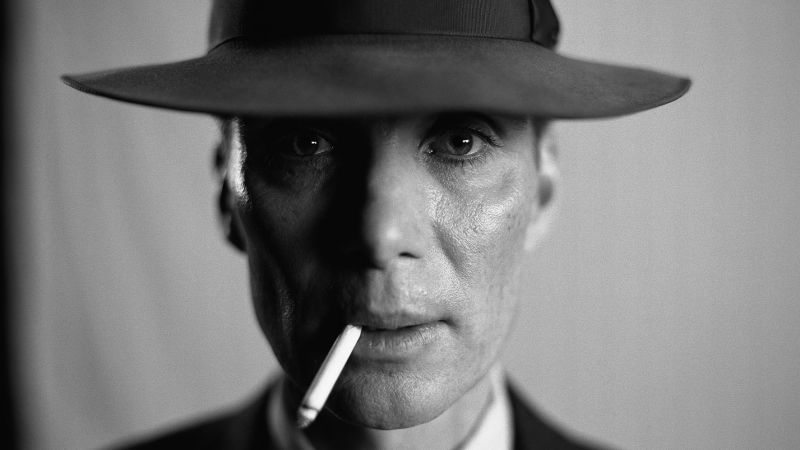Christopher Nolan’s latest blockbuster movie “Oppenheimer” has sparked controversy among the Hindu-right in India, with some calling for a boycott and demanding the removal of a sex scene in which the titular character utters a famous line from the religion’s holy scripture.
The film tells the story of the atomic bomb through the lens of its creator, Robert Oppenheimer, and the scene in question depicts actor Cillian Murphy, who plays the lead role, having sex with Florence Pugh, who plays his lover Jean Tatlock.
Pugh stops during intercourse and picks up a copy of the Bhagavad Gita, one of Hinduism’s holiest scriptures, and asks Murphy to read from it.
“Now I am become Death, the destroyer of worlds,” Oppenheimer’s character says, as they resume intercourse.
The scene has caused outrage among some right-wing groups, with a politician from India’s Hindu-nationalist Bharatiya Janata Party (BJP) calling the film a “disturbing attack on Hinduism” and accusing it of being “part of a larger conspiracy by anti-Hindu forces.”
In a statement Saturday, India’s Information Commissioner, Uday Mahurkar, said the scene was “a direct assault on religious beliefs of a billion tolerant Hindus,” likening it to “waging a war on the Hindu community.”
He added: “We believe that if you remove this scene and do the needful to win hearts of Hindus, it will go a long way to establish your credentials as a sensitized human being and gift you friendship of billions of nice people.”
The film has been received well in most quarters in India, which conducted its first nuclear test in 1974, with critics giving it rave reviews and people flocking to cinemas to watch it.
“Oppenheimer” grossed more than $3 million in its opening weekend in the country, according to local reports, higher than filmmaker Greta Gerwig’s highly anticipated “Barbie,” which released on the same day and grossed just over $1 million.
India’s film board gave “Oppenheimer” a U/A rating, which is reserved for movies that contain moderate adult themes and can be watched by children under 12 with parental guidance. There are so far no bans on the film in any of the country’s states and union territories.
This isn’t the first time that the Hindu-right has taken offense to films, television shows or commercials for its portrayal of Hinduism. Some have been boycotted or even forced off air following outcry from conservative and radical groups.
In 2020, Netflix
(NFLX) received significant backlash in India for a scene in the series “A Suitable Boy” that depicted a Hindu woman and Muslim man kissing at a Hindu temple. That same year, Indian jewelry brand Tanishq withdrew an advert featuring an interfaith couple following online criticism.
Meanwhile, analysts and film critics say there has been a shift in the tone of some Indian films, with nationalist and Islamophobic narratives gaining support from many within India, as well as the BJP.
Last year, filmmaker Vivek Agnihotri’s box office smash “The Kashmir Files,” based on the mass exodus of Kashmiri Hindus as they fled violent Islamic militants in the 1990s, polarized India, with some hailing the film as “gut-wrenching” and “truthful,” while others criticized it for being Islamophobic and inaccurate.
Similarly, the release this year of “The Kerala Story,” about a Hindu girl who is lured into joining ISIS, angered critics who called it a propaganda film that demonized Muslims.
Ahead of the release of “Oppenheimer,” Murphy said he read the Bhagvad Gita in preparation.
“I thought it was an absolutely beautiful text, very inspiring,” he told Indian film critic Sucharita Tyagi in an interview. “I think it was a consolation to him [Oppenheimer], he kind of needed it and it provided him a lot of consolation, all his life.”
Oppenheimer, who is known as the “father” of the atomic bomb, was drawn to Hinduism and its teachings. A polyglot and polymath, he taught himself multiple languages, including Sanskrit.
Speaking to interviewers two decades after the Trinity test bomb, the world’s first nuclear explosion, took place on July 16, 1945, Oppenheimer said: “We know the world would not be the same. A few people laughed, a few people cried, most people were silent.”
He said he remembered a line from the Bhagavad Gita: “Now, I am become Death, the destroyer of worlds.”
That line is used in the film multiple times, including during the sex scene.
Read the full article here















